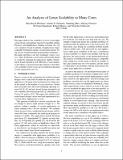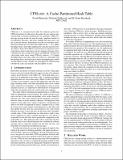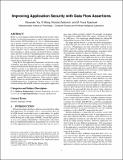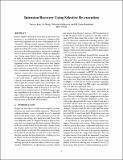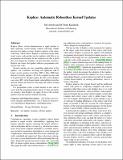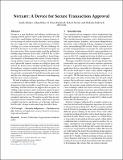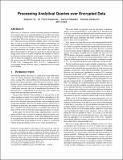Browsing by Author "Kaashoek, M. Frans"
Now showing items 1-20 of 27
-
An Analysis of Linux Scalability to Many Cores
Boyd-Wickizer, Silas; Clements, Austin T.; Mao, Yandong; Pesterev, Aleksey; Kaashoek, M. Frans; e.a. (USENIX Association, 2010-10)This paper analyzes the scalability of seven system applications (Exim, memcached, Apache, PostgreSQL, gmake, Psearchy, and MapReduce) running on Linux on a 48- core computer. Except for gmake, all applications ... -
Argosy: verifying layered storage systems with recovery refinement
Chajed, Tej; Tassarotti, Joseph; Kaashoek, M. Frans; Zeldovich, Nickolai (Association for Computing Machinery (ACM), 2019-06)Storage systems make persistence guarantees even if the system crashes at any time, which they achieve using recovery procedures that run after a crash. We present Argosy, a framework for machine-checked proofs of storage ... -
Certifying a file system using crash hoare logic
Chajed, Tej; Chen, Haogang; Chlipala, Adam; Kaashoek, M. Frans; Zeldovich, Nickolai; e.a. (Association for Computing Machinery (ACM), 2017-04)FSCQ is the frst fle system with a machine-checkable proof that its implementation meets a specifcation, even in the presence of fail-stop crashes. FSCQ provably avoids bugs that have plagued previous fle systems, such as ... -
CPHASH: A cache-partitioned hash table
Metreveli, Zviad; Zeldovich, Nickolai; Kaashoek, M. Frans (Association for Computing Machinery (ACM), 2012-02)CPHash is a concurrent hash table for multicore processors. CPHash partitions its table across the caches of cores and uses message passing to transfer lookups/inserts to a partition. CPHash's message passing avoids the ... -
Device Transparency: a New Model for Mobile Storage
Strauss, Jacob A.; Lesniewski-Laas, Christopher Tur; Paluska, Justin Mazzola; Ford, Bryan; Morris, Robert Tappan; e.a. (Association for Computing Machinery, 2010-01)This paper proposes a new storage model, device transparency, in which users view and manage their entire data collection from any of their devices, even from disconnected storage-limited devices holding only a subset of ... -
Extracting and Optimizing Formally Verified Code for Systems Programming
Ioannidis, Eleftherios; Kaashoek, M. Frans; Zeldovich, Nickolai (Springer International Publishing, 2019-05)MCQC is a compiler for extracting verified systems programs to low-level assembly, with no runtime or garbage collection requirements and an emphasis on performance. MCQC targets the Gallina functional language used in the ... -
Flexible, Wide-Area Storage for Distributed Systems with WheelFS
Stribling, Jeremy; Sovran, Yair; Zhang, Irene; Pretzer, Xavid F.; Li, Jinyang; e.a. (USENIX Association, 2009-04)WheelFS is a wide-area distributed storage system intended to help multi-site applications share data and gain fault tolerance. WheelFS takes the form of a distributed file system with a familiar POSIX interface. Its design ... -
Hare: a file system for non-cache-coherent multicores
Gruenwald, Charles; Sironi, Filippo; Kaashoek, M. Frans; Zeldovich, Nickolai (Association for Computing Machinery (ACM), 2015-04)Hare is a new file system that provides a POSIX-like interface on multicore processors without cache coherence. Hare allows applications on different cores to share files, directories, and file descriptors. The challenge ... -
Improving application security with data flow assertions
Yip, Alexander; Wang, Xi; Zeldovich, Nickolai; Kaashoek, M. Frans (Association for Computing Machinery, 2009-10)Resin is a new language runtime that helps prevent security vulnerabilities, by allowing programmers to specify application-level data flow assertions. Resin provides policy objects, which programmers use to specify assertion ... -
Intrusion Recovery Using Selective Re-execution
Kim, Taesoo; Wang, Xi; Zeldovich, Nickolai; Kaashoek, M. Frans (USENIX Association, 2010-10)RETRO repairs a desktop or server after an adversary compromises it, by undoing the adversary's changes while preserving legitimate user actions, with minimal user involvement. During normal operation, RETRO records an ... -
Ksplice: Automatic Rebootless Kernel Updates
Kaashoek, M. Frans; Arnold, Jeffrey B. (Association for Computing Machinery, 2009)Ksplice allows system administrators to apply patches to their operating system kernels without rebooting. Unlike previous hot update systems, Ksplice operates at the object code layer, which allows Ksplice to transform ... -
Linux Kernel Vulnerabilities: State-of-the-Art Defenses and Open Problems
Chen, Haogang; Mao, Yandong; Wang, Xi; Zhou, Dong; Zeldovich, Nickolai; e.a. (Association for Computing Machinery (ACM), 2011-07)Avoiding kernel vulnerabilities is critical to achieving security of many systems, because the kernel is often part of the trusted computing base. This paper evaluates the current state-of-the-art with respect to kernel ... -
Notary: a device for secure transaction approval
Athalye, Anish; Belay, Adam M; Kaashoek, M. Frans; Morris, Robert; Zeldovich, Nickolai (Association for Computing Machinery (ACM), 2019-10)Notary is a new hardware and software architecture for running isolated approval agents in the form factor of a USB stick with a small display and buttons. Approval agents allow factoring out critical security decisions, ... -
Position: GDPR Compliance by Construction
Schwarzkopf, Malte; Kohler, Eddie; Kaashoek, M. Frans; Morris, Robert Tappan (Springer International Publishing, 2019)© 2019, Springer Nature Switzerland AG. New laws such as the European Union’s General Data Protection Regulation (GDPR) grant users unprecedented control over personal data stored and processed by businesses. Compliance ... -
Processing Analytical Queries over Encrypted Data
Tu, Stephen Lyle; Kaashoek, M. Frans; Madden, Samuel R.; Zeldovich, Nickolai (Association for Computing Machinery (ACM), 2013-08)MONOMI is a system for securely executing analytical workloads over sensitive data on an untrusted database server. MONOMI works by encrypting the entire database and running queries over the encrypted data. MONOMI introduces ... -
RadixVM: Scalable address spaces for multithreaded applications
Clements, Austin T.; Kaashoek, M. Frans; Zeldovich, Nickolai (Association for Computing Machinery (ACM), 2013-04)RadixVM is a new virtual memory system design that enables fully concurrent operations on shared address spaces for multithreaded processes on cache-coherent multicore computers. Today, most operating systems serialize ... -
Reinventing Scheduling for Multicore Systems
Boyd-Wickizer, Silas; Morris, Robert Tappan; Kaashoek, M. Frans (IEEE Computer Society Press, 2009-05)High performance on multicore processors requires that schedulers be reinvented. Traditional schedulers focus on keeping execution units busy by assigning each core a thread to run. Schedulers ought to focus, however, ... -
Retroactive auditing
Wang, Xi; Zeldovich, Nickolai; Kaashoek, M. Frans (Association for Computing Machinery (ACM), 2011-01)Retroactive auditing is a new approach for detecting past intrusions and vulnerability exploits based on security patches. It works by spawning two copies of the code that was patched, one with and one without the patch, ... -
Scalable Address Spaces Using Rcu Balanced Trees
Clements, Austin T.; Kaashoek, M. Frans; Zeldovich, Nickolai (Association for Computing Machinery (ACM), 2012-03)Software developers commonly exploit multicore processors by building multithreaded software in which all threads of an application share a single address space. This shared address space has a cost: kernel virtual memory ... -
The scalable commutativity rule: designing scalable software for multicore processors
Clements, Austin T.; Kaashoek, M. Frans; Zeldovich, Nickolai; Morris, Robert Tappan; Kohler, Edward W. (Association for Computing Machinery, 2013)What fundamental opportunities for scalability are latent in interfaces, such as system call APIs? Can scalability opportunities be identified even before any implementation exists, simply by considering interface ...

